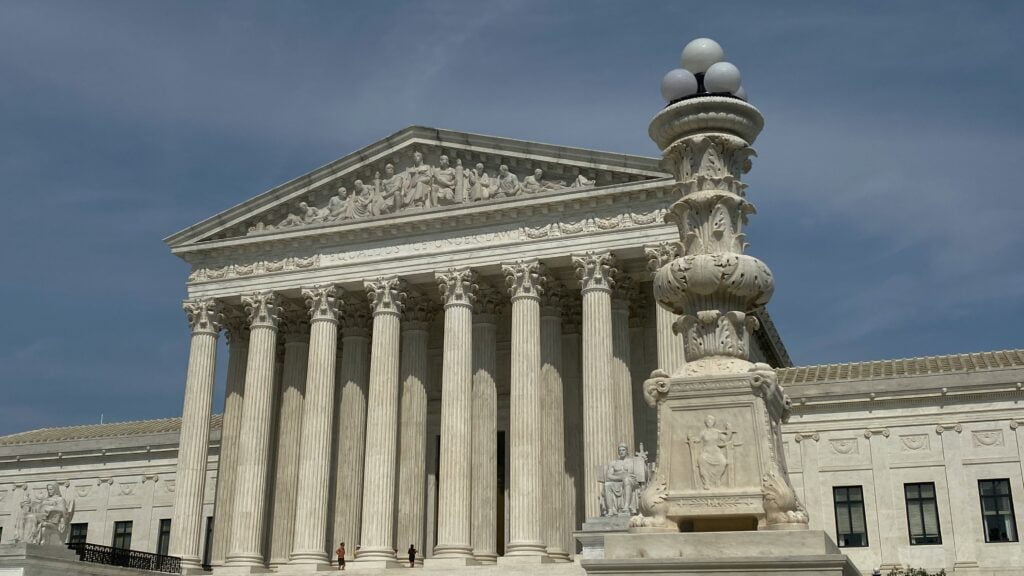Washington, D.C. (Oregon Right to Life) — The U.S. Supreme Court on Thursday rejected a case brought by pro-life medical professionals challenging the loosening of guardrails on one of two drugs used in chemical abortions.
In its unanimous June 13 decision, the Supreme Court ruled that the Alliance for Hippocratic Medicine (AHM) did not have legal standing to sue the FDA over its recent policy changes expanding access to the abortion drug mifepristone. Mifepristone is taken to block the action of the growth hormone progesterone, causing the unborn human being in the womb to starve to death. The second drug in the chemical abortion regimen, misoprostol, is taken 24–72 hours later to induce contractions to expel the body.
In 2016, the FDA implemented a new policy that widened the timeframe in which mifepristone could be prescribed during pregnancy. In 2021, during the COVID-19 pandemic, the FDA permitted mifepristone to be prescribed online and distributed via mail. Local pharmacies were also authorized to dispense the drugs. In January 2023, that permission was extended to drug stores.
Chemical abortions currently comprise more than half of all abortions nationwide.
Represented by the Alliance Defending Freedom (ADF), the AHM filed a lawsuit against the FDA and the HHS in November 2022, seeking to overturn both the original FDA approval of mifepristone in 2000 and the recent policy changes expanding access to the drug. In December 2023, the Supreme Court declined to examine the initial FDA approval of mifepristone, but agreed to take up the other arguments.
The Court heard oral arguments in the case in March, but on Thursday ruled the AHM lacked legal standing to sue.
In the June 13 decision, Justice Brett Kavanaugh acknowledged that the AHM had “sincere legal, moral, ideological, and policy objections to elective abortion and to FDA’s relaxed regulation of mifepristone,” but said “the federal courts are the wrong forum for addressing the plaintiffs’ concerns,” since the AHM did not show that they had suffered injury from the FDA’s moves.
The Court did not make any judgment on the propriety or legality of the FDA’s policy changes.
READ: US Supreme Court to Hear Oral Arguments In Abortion Drug Case
The Thursday ruling has come as a disappointment to pro-life advocates, who hoped the Supreme Court would restore safeguards to protect pregnant women and the unborn. However, in statements released in the immediate aftermath of the decision, pro-life leaders have signaled that the Court’s ruling will not put an end to their efforts to curb mifepristone distribution.
“The ruling is procedural [and] fails to engage the [Biden administration’s] unlawful actions,” Live Action president Lila Rose reacted on X. “Those unlawful actions will be back at SCOTUS soon.”
BREAKING: SCOTUS has rejected the case by doctors who challenged the Biden Admin’s reckless abortion expansion that illegally allows mail-order abortion pills.
— Lila Rose (@LilaGraceRose) June 13, 2024
The ruling is procedural
& fails to engage the Admin’s unlawful actions. Those unlawful actions will be back at SCOTUS…
“It is a sad day for all who value women’s health and unborn children’s lives,” Susan B. Anthony (SBA) Pro-Life America state policy director Katie Daniel said in a statement. She added that “the fight to stop dangerous mail-order abortion drugs is not over.”
March for Life president Jeanne Mancini said that her organization “is disappointed by the Supreme Court’s decision today… which enables the FDA to continue disregarding the health and safety of women and young girls across the nation.”
“The agency’s reckless removal of nearly all safeguards surrounding the drug — like the care of a medical provider and the requirement for prescribers to report medical emergencies — is unacceptable, and the FDA’s own label on mifepristone shows that roughly 1 in 25 women are forced to go to in the emergency room because of horrific complications,” Mancini said.
"The March for Life is disappointed by the Supreme Court’s decision today in FDA v. Alliance for Hippocratic Medicine which enables the FDA to continue disregarding the health and safety of women and young girls across the nation. The agency’s reckless removal of nearly all…
— March for Life (@March_for_Life) June 13, 2024
The FDA warning label for the mifepristone and misoprostol regimen states that roughly 85% of women who consume the drugs report at least one adverse reaction, most commonly “nausea, weakness, fever/chills, vomiting, headache, diarrhea, and dizziness.” Up to 8% of women reportedly experience bleeding for more than 30 days, and between 2.9–4.6% visit the emergency room after taking the drugs, though other contributing circumstances may exist.
“It is sad that because of these FDA decisions, women will not get the information they deserve before making a permanent life or death decision,” Carol Tobias, president of National Right to Life, said in a statement.
“Women remain unprotected from common complications with the abortion drug such as hemorrhage, infection, and failure to identi[f]y rupturing ectopic pregnancies in a timely manner,” she said. “Tracking these complications became more difficult in 2016 when the FDA decided that medical personnel and facilities do not need to report complications arising from the use of the abortion pill mifepristone.”
“While the abortion pill remains legal, we hope this battle to reinstate safety precautions will continue,” she said.
RELATED: ‘Appalling and Dangerous’: Radical Group Helps Women in Pro-Life States Get Chemical Abortions
And the battle could continue in federal court with the intervention of three states.
Idaho, Kansas, and Missouri intervened in the lawsuit in district court and attempted to do so in the now-concluded Supreme Court case. They could continue the litigation in federal court, arguing that they have the standing that the AHM lacked.
Erin Morrow Hawley, ADF senior counsel, said “We expect litigation to continue, with those states making additional arguments.”
Kris Kobach, the Republican attorney general of Kansas, said in a statement Thursday that it’s “essential that this case continue in order to ensure that the FDA operates within the law,” explaining that Kansas, Missouri, and Idaho “possess the standing that the doctors did not.”
The ADF expressed gratitude for Idaho, Kansas, and Missouri for being “ready to hold the FDA accountable for jeopardizing the health and safety of women and girls across this country.”
Additional Resources:





